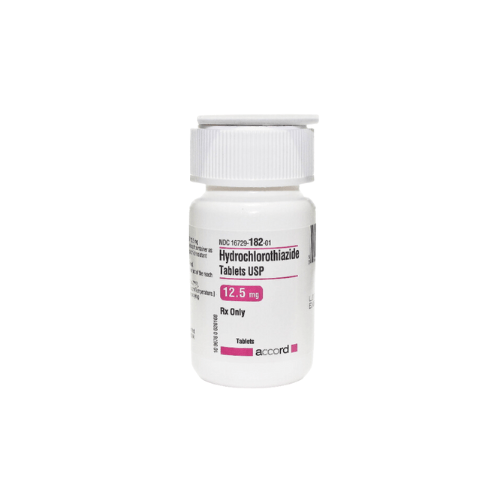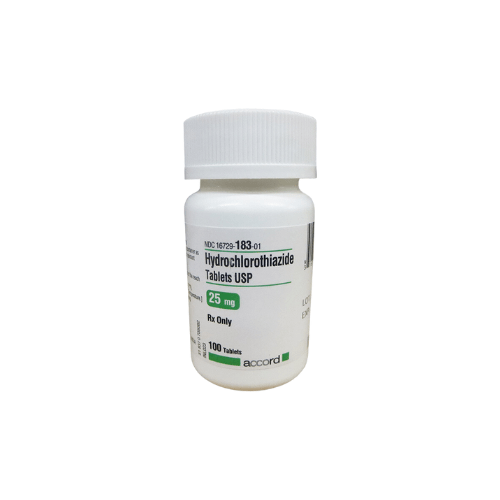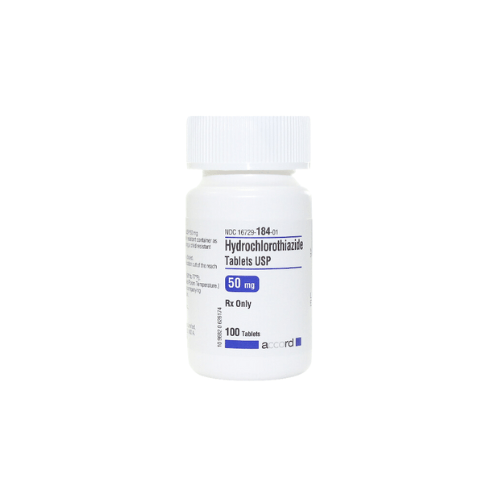Please note: a valid prescription is required for all prescription medication.
Hydrochlorothiazide Tablets for Hypertension
Get $50 off all orders over $200. Valid on all medications. Use code GET50 at checkout. Offer valid until March 1st.
Coupon code cannot be combined with other offers. Maximum allowable quantity equal to a 90 day supply per single order.Campaign valid for all products, except Mounjaro Vial.
Price range: $23.99 through $43.99
Secure Encrypted Payments
Hydrochlorothiazide is a thiazide diuretic used to treat high blood pressure and swelling from fluid buildup. It helps your body remove extra salt and water through the kidneys. You can access Canadian-sourced options with US shipping from Canada, and you may see lower costs even without insurance.
What Hydrochlorothiazide Is and How It Works
This medicine reduces sodium reabsorption in the distal tubules, increasing urine output. The result can be lower blood pressure and reduced edema in conditions such as heart failure, liver disease, or certain kidney disorders. It is often part of a broader plan that includes diet, activity, and other therapies as directed by your prescriber. Border Free Health connects U.S. patients with licensed Canadian partner pharmacies; prescriptions are verified with prescribers before dispensing.
The treatment may be used alone or alongside other antihypertensives. Over time, fluid reduction can also lighten the workload on the heart. Clinical labeling notes that the effect on blood pressure may build over several weeks with regular use.
Many people also take complementary agents such as ACE inhibitors or ARBs. Examples include options like Ramipril Hcl, Losartan, or Irbesartan when advised by a clinician.
Who It’s For
This therapy is indicated for adults with hypertension and for edema due to heart failure, nephrotic syndrome, corticosteroid or estrogen therapy, and certain kidney conditions. A hydrochlorothiazide pill may be considered when your prescriber prefers a thiazide diuretic as initial or add-on therapy.
People with anuria should not use it. Those with severe kidney or liver disease, a history of sulfonamide allergy, gout, or electrolyte imbalances need careful evaluation. Discuss pregnancy and breastfeeding with your clinician, as thiazides can cross the placenta and enter breast milk. Patients with diabetes, photosensitivity, or low potassium may require additional monitoring.
For edema in heart failure, prescribers may pair this drug with loop diuretics such as Lasix or a potassium-sparing option like Spironolactone Hctz as clinically appropriate.
Dosage and Usage
Follow your prescriber’s directions and the official label. Typical adult hypertension dosing starts low and may increase gradually. Many patients begin with once-daily dosing in the morning. For some, hctz 25 mg once daily is used, while others may require different strengths or combination tablets based on response and tolerance.
For edema, a larger single dose or divided doses may be used. Take with or without food. Swallow tablets with water and avoid late-evening dosing to limit nighttime urination. Regular labs may be ordered to monitor potassium, sodium, kidney function, and uric acid. Do not change your dose without guidance from your healthcare professional. Review the FDA or Health Canada label if you need more detail.
If you also take other antihypertensives, your prescriber may adjust timing to minimize dizziness or drops in blood pressure. Rising slowly from sitting or lying positions may help reduce lightheadedness. Limit alcohol, which can worsen orthostatic symptoms.
Strengths and Forms
Availability may vary by manufacturer and pharmacy partner. Common presentations include:
- hydrochlorothiazide 12.5 mg tablets
- 25 mg tablets
- 50 mg tablets
- Selected 12.5 mg capsules depending on supplier
Some patients use fixed-dose combinations that include an ACE inhibitor or an ARB. Your prescriber will help choose the form that aligns with your treatment plan.
Missed Dose and Timing
If you miss a dose, take it when you remember the same day. Skip it if it is close to the next scheduled dose. Do not double up. Taking it in the morning can reduce nighttime bathroom trips. Keep a simple routine and a reminder system to support steady use.
Storage and Travel Basics
Store tablets at room temperature in a dry place, away from excess heat and light. Keep the bottle closed tightly and out of reach of children and pets. Use the original container with the label for easy identification.
When traveling, pack enough for the entire trip plus a few extra days, in case plans change. Carry a copy of your prescription and a medication list. A small pill organizer can help if allowed by your prescriber. Do not store tablets in a bathroom where humidity is high. Keep them in your carry-on when flying to avoid temperature swings.
Benefits
This diuretic class can help lower blood pressure and reduce swelling. Once-daily schedules are common, which may support adherence. The treatment can be combined with other blood pressure medicines to reach goals set by your clinician. Many patients appreciate that tablets are compact and straightforward to take.
Lowering blood pressure can reduce the risk of cardiovascular events when used as part of a broader plan. Regular monitoring helps confirm the therapy is working as intended.
Side Effects and Safety
- More frequent urination, especially at the start
- Dizziness or lightheadedness
- Low potassium or low sodium
- Increased uric acid or gout flares
- Headache or weakness
- Upset stomach
- Photosensitivity or rash
Serious effects can occur but are less common. These include severe skin reactions, pancreatitis, jaundice, significant electrolyte disturbances, or eye symptoms consistent with acute angle-closure glaucoma. Get urgent care for severe rash, visual changes, yellowing of skin or eyes, or signs of dehydration. Patients on digoxin or antiarrhythmics may require closer potassium monitoring. Those using insulin or sulfonylureas should watch glucose trends, as thiazides can affect glycemic control.
Drug Interactions and Cautions
Several medicines can interact. Lithium levels can rise, increasing toxicity risk. NSAIDs may reduce the blood pressure effect. Steroids and ACTH can worsen hypokalemia. Other antihypertensives have additive effects on blood pressure. Cholestyramine or colestipol can decrease absorption; timing may need separation per the label.
Digoxin risk increases with low potassium. Alcohol can intensify dizziness. Tell your clinician about supplements, such as potassium or magnesium, and about conditions like gout or diabetes. Sun sensitivity may increase, so protective clothing and sunscreen can help.
What to Expect Over Time
Blood pressure may improve steadily with regular daily use and lifestyle measures. Swelling often decreases when fluid balance stabilizes. Your clinician may check labs and vital signs and adjust therapy as needed. Most people continue long term if tolerated and effective.
Set reminders and keep a simple routine. Track home readings if advised. Bring your cuff and logs to appointments. If you start new medicines or notice new symptoms, inform your prescriber promptly.
Compare With Alternatives
Some patients use fixed-dose combinations to simplify regimens. A common pairing is an ACE inhibitor plus HCTZ, such as Lisinopril Hctz Type Z. Others may use an ARB plus HCTZ, such as Valsartan Hct. Prescribers also consider agents like atenolol or nebivolol in selected cases; see background in our article Atenolol Uses. In some treatment plans, valsartan hydrochlorothiazide can streamline dosing when appropriate.
Pricing and Access
See current options and compare the hydrochlorothiazide price alongside similar therapies. You get Canadian pricing with convenient US shipping from Canada. View available pack sizes to align with your prescription. Checkout is encrypted. If you watch for seasonal offers, visit our Promotions page.
Savings CTA: Explore cash-pay savings and compare generics for your plan. Pricing CTA: Check live pricing and see eligible quantities before you add to cart.
Availability and Substitutions
Supply can vary by strength, pack size, and manufacturer. If a specific tablet is unavailable, your prescriber may recommend a comparable option or a fixed-dose combination. Pharmacist review will confirm that any substitution matches your prescription and clinical needs.
Patient Suitability and Cost-Saving Tips
Adults with hypertension or edema may be candidates when a thiazide is appropriate. People with anuria, severe renal impairment, or a history of severe sulfonamide reactions should avoid use. Ask about multi-month fills if your prescriber approves, which can reduce refill trips.
Set refill reminders so you do not miss doses. If permitted, larger pack sizes can lower per-unit expenses. Discuss combination tablets like lisinopril plus HCTZ or telmisartan with HCTZ if they simplify therapy. Compare the hydrochlorothiazide cost with alternatives and look at your cash price versus any plan copay structures.
For related conditions and classes, explore our Hypertension category and the broader Cardiovascular section. Patients managing edema can review guidance options within Edema resources, as advised by a clinician.
Questions to Ask Your Clinician
- Starting dose plan: how will my dose be adjusted?
- Monitoring: which labs and how often?
- Combination therapy: would an ACE inhibitor or ARB help?
- Potassium strategy: diet, supplements, or both?
- Dosing time: morning only or split dosing for edema?
- Sun safety: what protection do you recommend?
- Gout history: how should we prevent flares?
Authoritative Sources
For detailed, official information, see:
Learn more about cardiovascular risks in our article Diabetic Nephropathy for broader context around kidney health and blood pressure.
Ready to proceed? You can add to cart and complete checkout with prompt, express shipping and US shipping from Canada. Temperature-controlled handling when required. This page is for general information and does not replace advice from your healthcare professional.
Express Shipping - from $25.00
Shipping with this method takes 3-5 days
Prices:
- Dry-Packed Products $25.00
- Cold-Packed Products $35.00
Shipping Countries:
- United States (all contiguous states**)
- Worldwide (excludes some countries***)
Standard Shipping - $15.00
Shipping with this method takes 5-10 days
Prices:
- Dry-Packed Products $15.00
- Not available for Cold-Packed products
Shipping Countries:
- United States (all contiguous states**)
- Worldwide (excludes some countries***)
What is Hydrochlorothiazide prescribed for?
Hydrochlorothiazide is a thiazide diuretic used to treat high blood pressure (hypertension) and fluid retention (edema) caused by various conditions such as heart failure or kidney disorders.
How does Hydrochlorothiazide work in the body?
It works by helping the kidneys remove excess salt and water from the body, lowering blood pressure and reducing swelling. This effect also helps reduce the risk of strokes and heart attacks.
When should I take Hydrochlorothiazide?
It is usually taken once daily, preferably in the morning, to avoid frequent nighttime urination. Take it with or without food, and always follow your doctor’s instructions for dosing.
Are there any precautions I should take while using this medication?
Stay hydrated and avoid becoming overheated or dehydrated. This drug may affect your electrolyte balance, so monitoring blood potassium, sodium, and kidney function is essential.
What are the common side effects?
Common side effects include increased urination, dizziness, weakness, or low blood pressure. Rare but serious side effects include allergic reactions, electrolyte imbalances, or gout flare-ups.
How does hydrochlorothiazide lower blood pressure?
Hydrochlorothiazide is a thiazide diuretic. It reduces sodium reabsorption in the kidneys, which increases urine output. Lower total body sodium and fluid can help reduce blood pressure and swelling. The effect on blood pressure often builds gradually with regular daily use. Your prescriber may combine this medicine with other agents from different classes to reach your individual targets safely.
What should I avoid while taking this diuretic?
Limit alcohol, which can worsen dizziness. Be careful with NSAIDs like ibuprofen, since they can blunt the blood pressure effect. Avoid excessive sun exposure and use protection due to possible photosensitivity. Do not start or stop supplements such as potassium or magnesium without guidance. Discuss any new prescriptions to prevent interactions, including lithium, digoxin, or cholestyramine.
When is the best time of day to take it?
Many patients take their dose in the morning to reduce nighttime bathroom trips. Follow the plan your prescriber sets, and be consistent from day to day. If your plan includes divided dosing for edema, take doses as scheduled. If you miss a dose, take it the same day when remembered or skip if close to the next dose. Do not double up.
Can I use hydrochlorothiazide with an ACE inhibitor or an ARB?
Yes, clinicians often pair a thiazide diuretic with an ACE inhibitor or an ARB. This combination can have additive effects on blood pressure. Examples include lisinopril plus HCTZ or valsartan plus HCTZ. Your prescriber will determine if a fixed-dose combination tablet or separate tablets fits your plan, based on response and tolerance.
What lab tests might be monitored?
Your clinician may check electrolytes such as potassium and sodium, kidney function, and uric acid. Monitoring helps assess safety and effectiveness. Some patients also track glucose, especially those with diabetes. Testing frequency depends on your dose, medical history, and other medicines. Ask how often to repeat labs and what changes would prompt a therapy adjustment.
What are serious side effects I should recognize?
Seek urgent care for severe rash, eye pain or vision changes, signs of dehydration, fainting, or yellowing of the skin or eyes. Report muscle weakness, irregular heartbeat, or confusion, which may reflect significant electrolyte problems. Serious effects are less common but require prompt attention. Keep your care team informed about any new or worsening symptoms.
Are there alternatives if I do not tolerate this medicine?
Yes, your prescriber may suggest another diuretic, a different class such as an ACE inhibitor, ARB, or beta blocker, or a fixed-dose combination tablet to simplify dosing. Some people transition to agents like chlorthalidone or to combination therapies if suitable. The choice depends on your medical history, lab results, and treatment goals.
Rewards Program
Earn points on birthdays, product orders, reviews, friend referrals, and more! Enjoy your medication at unparalleled discounts while reaping rewards for every step you take with us.
You can read more about rewards here.
POINT VALUE
How to earn points
- 1Create an account and start earning.
- 2Earn points every time you shop or perform certain actions.
- 3Redeem points for exclusive discounts.
How to book an appointment
- 1Create Begin by completing a profile or log into your existing account. This step ensures we have the necessary information to provide you with a service that's tailored to your needs. account and start earning.
- 2Scheduling an appointment with our online booking system is easy. Pick a day and time that suits you. You’ll receive an immediate confirmation, without the wait.
- 3Discuss your concerns and symptoms and receive a thorough diagnosis from one of our licensed doctors during a confidential video appointment.
- 4If you've been prescribed medication, your Rx is sent directly to one of our licensed pharmacies and delivered right to your door.
Get Started
To book an online doctor appointment, register for an account or login. After doing so, you can book your visit on this page.


